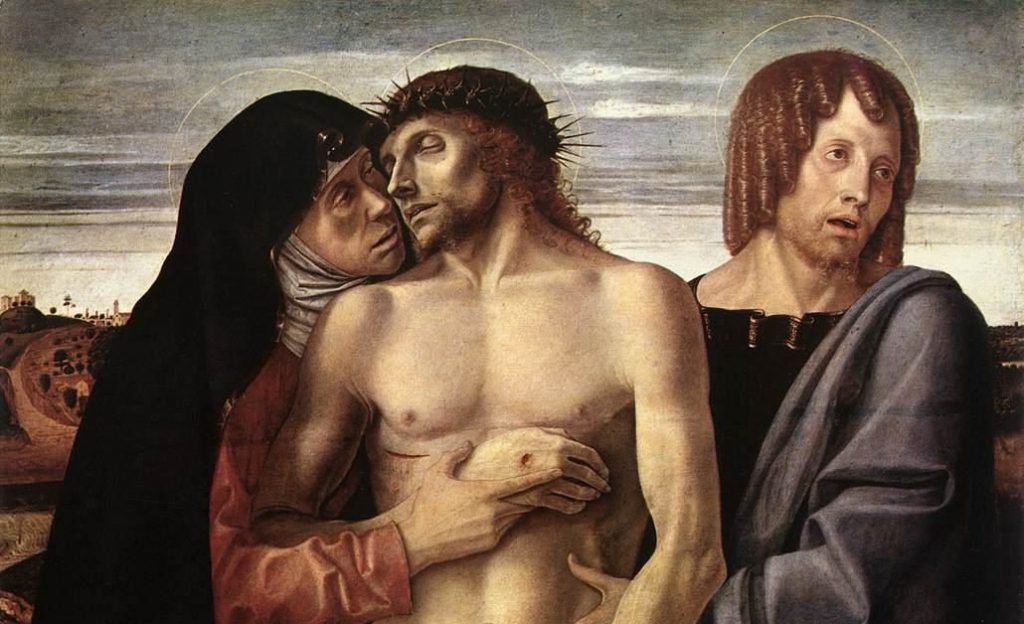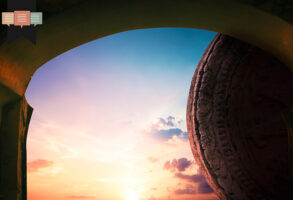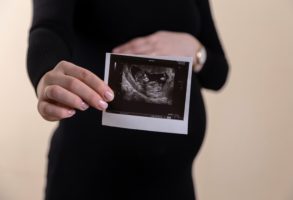
Published April 3, 2021
As a person of the Christian faith, I’ve long understood what the Apostle Peter meant when he said, “By his wounds you have been healed.”
But I have always wondered why Jesus, after his Resurrection, in his glorified body, still bore the visible marks of his wounds. After all, scars are signs of imperfection, a defacement, something most of us try to hide — and in the case of Jesus, they were reminders of searing pain, vulnerability and indignity.
In his Summa Theologica, St. Thomas Aquinas, in listing objections he would go on to answer, wrote, “Scars and wounds imply corruption and defect.” It was not fitting for Christ, “the author of the Resurrection, to rise again with scars.” Yet he did.
Throughout my Christian journey, which began as a skeptical young man writing down question after question on my dad’s work stationery, I’ve found that there are aspects of my faith that I don’t fully understand and that sometimes I hardly understand. They seem both counterintuitive and profound, but for reasons that lie just out of my grasp. It’s at moments like these that I reach out to people wiser than I am — an unofficial community of theologians, pastors and friends — who help me to see new patterns emerge.
In sorting through this complicated topic, maybe the place to start is with the Christian belief that Jesus’ death by crucifixion was part of an unfolding drama, not the end of the story. Russell Moore, president of the Ethics and Religious Liberty Commission, told me that “the Resurrection is not the overturning of the cross, as though crucifixion were defeat and Resurrection a contradiction of that defeat. The cross and the Resurrection were part of one act of love and mission and redemption.”
“The Resurrection does not annihilate the old creation,” as Dr. Moore put it. “It reconfigures it.”
Cherie Harder, president of The Trinity Forum, told me, “I wonder if part of the reason Jesus’s redeemed body bore the nail marks is because doing so reflects who he is, as well as what he has suffered, and the fullness of the healing and redemption.”
According to Duke Divinity School’s Kate Bowler, “We bear all the ruins of the lives we’ve lived and the loves we’ve endured. What a gift to have a Savior who does the same.” The Episcopal priest and theologian Fleming Rutledge expressed it to me this way: “The wounds of our Redeemer will always be there, for all eternity, as the sign of the price he paid — ‘Love divine, all loves excelling.’” Or, as she went on to say, “For ever and ever, the price that was paid by the Son of God will be the measure of his love.” To assert the love you have for another is one thing; to pay the supreme cost as an expression of that love is quite another.
But don’t the prints of the nails, the gash of the spear, reveal weakness and vulnerability? Wouldn’t it be better to remove rather than memorialize the visible signs of an agonizing death?
Andy Crouch, who writes about the intersection of Christianity and culture, pointed out to me that the Latin word “vulnerable” comes from “vulnus,” which means “wound.” If God is woundable, is God therefore vulnerable? “The persistence of the scars show that the answer is unmistakably, and eternally, yes,” Mr. Crouch said.
He added this:
If a scar is a healed wound, a wound that the body has marvelously managed to rescue and restore — then in some way, Christ’s entire bodily form, having suffered the ultimate injury of death but having been rescued and restored, is that of a scar. He will be worshiped, the book of Revelation (5:6) says, in the form of “a Lamb looking as if it had been slain.” Perhaps our scars, which are so often a source of shame and regret, are the truest clues we have to the full form of our resurrection bodies.
These observations echo those of St. Augustine, who speculated that we shall see in the bodies of martyrs the traces of the wounds they bore for Christ’s name “because it will not be a deformity, but a dignity in them; and a certain kind of beauty will shine in them.”
Philip Yancey, in responding to my query about why the glorified body of Jesus would be disfigured by scars, said, “Jesus’ retained wounds stand as a visual proof.” Mr. Yancey, whose books include “What’s So Amazing About Grace?” and “The Jesus I Never Knew,” added:
He could have had a perfect body, or no body, when he returned to splendor in heaven. Instead he kept a remembrance of his visit to earth, and for a keepsake of his time here, he chose scars. The pain of humanity became the pain of God.
By now answers that had eluded me were coming into focus. “That Jesus’ wounds are also seen in his resurrected body underscores that the suffering love that led Jesus to a cross and to wear a crown of thorns is part of God’s eternal redeeming love for humanity,” Mark Labberton, the president of Fuller Theological Seminary, told me. “The scars witness to God’s suffering, resurrected hope.”
Beyond that, Dr. Labberton said, the fact that the traces of Jesus’ wounds aren’t simply wiped away allows us to “make meaning of our losses, and to make meaning of our lives.” In other words, an essential part of what happened to Jesus shouldn’t be forgotten — it cannot be forgotten — even in eternity.
In this way, it is similar to the situation facing victims of trauma, according to Dr. Labberton. To recover, they shouldn’t be told to forget their trauma; they need to find ways to re-contextualize and integrate it into their life stories. It is part of their story, never to be downplayed, but it need not define who they are in perpetuity. “The wounds of Jesus are not the final word,” according to Dr. Labberton, “but they are meaningful.”
Or, as Cherie Harder put it to me, “Healing requires seeing.”
Scott Dudley, the senior pastor at Bellevue Presbyterian Church in Bellevue, Wash., told me that when he’s counseling or mentoring others “often the most helpful thing I bring is my wounds.” He added, “Everything important about being a pastor I did not learn in seminary.” He learned it through the pain of a personal loss that will never completely fade. “Wounded people make the best healers because they know what it means to be wounded,” Dr. Dudley said. “I’m a better healer not in spite of my wounds, but because of my wounds.”
“All that to say sometimes the most helpful things we bring is our wounds, which is another reason Jesus kept a reminder of his,” he added. His point isn’t that Jesus’ wounds were flaws; it is that they were wounds that left scars, and that not hiding them from us is a great help to us.
This hints at one of the most important human (and divine) qualities: empathy. “If Jesus showed us his scars, even after his Resurrection, then maybe we can learn to integrate pain and suffering into our lives in a way that frees us from wasting energy spent in denial and shame,” Peggy Wehmeyer, a former religion correspondent for ABC News, told me. She knows of what she speaks, having poignantly written in these pages about the suicide of her husband in 2008.
Simon Steer, the school chaplain at Abingdon School in Abingdon, England, said to me, “The risen but scarred body of Christ is the ultimate signifier of divine empathy.” It is a reminder to Dr. Steer that in his own struggles with depression, “Christ is with me in the dark night of the soul.” Jesus himself experienced a “dark night of the soul” at the Garden of Gethsemane, where we’re told his soul was “deeply grieved,” and especially as he hung on the cross, naked, beaten and left to die, feeling forsaken by God.
The artist Makoto Fujimura, author of the marvelous recent book “Art and Faith: A Theology of Making,” writes about the Japanese tradition of Kintsugi. Kintsugi is the art of repairing broken pottery pieces with lacquer dusted with gold. A Kintsugi master will take the broken work and create a restored piece that “makes the broken parts even more visually sophisticated,” according to Mr. Fujimura. “No two works, done with such mastery, will look the same or break the same way.” It is built on the idea that in embracing flaws and imperfections, you can create a more beautiful and more valuable piece of art.
Applying that concept to theology, Mr. Fujimura makes this point: It’s through our brokenness that God’s grace can shine through, “as in the gold that fills fissures in Kintsugi.” Jesus came not to “fix” us, according to Mr. Fujimura, and not just to restore us, but to make us something new.
“Even ‘fixing’ what is broken is an opportunity to transcend the ‘use’ of the object,” Mr. Fujimura writes in “Art and Faith”:
Kintsugi bowls are treasured as objects that surpass their original ‘useful’ purpose and move into a realm of beauty brought on by the Kintsugi master. Thus, our brokenness, in light of the wounds of Christ still visible after the resurrection, can also mean that through making, by honoring the brokenness, the broken shapes can somehow be a necessary component of the New World to come.
I find the concept that fractures in our lives can be redeemed and leveraged for good deeply moving. All things, even broken things, can be made new again, and sometimes they can be made even more beautiful. And they need not be hidden, in shadows or in shame. None of this means that people, if they had a choice, would endure the blast furnace of pain and loss, of trauma and shattered lives. It means only that even out of ashes beauty can emerge.
As we were discussing the topic of the Resurrection and the wounds of Jesus, the theologian Richard J. Mouw pointed me to the words from the 19th-century hymn, “Crown Him with Many Crowns”:
Crown him the Lord of love:
Behold his hands and side,
Rich wounds yet visible above,
In beauty glorified:
No angel in the sky
Can fully bear that sight,
But downward bends his burning eye
At mysteries so bright.
The line “in beauty glorified” particularly resonated with Dr. Mouw, a former professor of philosophy, who offered up his speculation that “Our own wounds will not be left in the grave but will also be in beauty glorified.” He told me that the fact that Jesus took the traces of his own wounds with him to heaven and beautified them can be seen as hopeful for us:
Our griefs, shamings, betrayals, disabilities are so much a part of who we are that they will not be simply discarded and left behind. They will become essential to the beauty that awaits us.
“‘Mysteries so bright’ indeed,” Dr. Mouw reiterated, bringing the phrase back to me. “Angels cannot grasp them. But one day we will.”
Mr. Wehner, who served in various roles in the three Republican administrations before the Trump administration, is a contributing Opinion writer. He attends McLean Presbyterian Church in McLean, Va.








